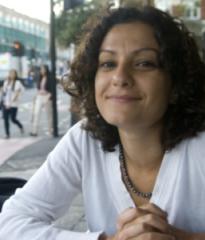Unauthorized memory
Yesterday they shot and killed a woman on Talaat Harb Street. She was walking, along with other members of the Socialist Alliance Party, through downtown to commemorate those killed since all of this started four years ago. Many of them were carrying flowers, wreaths to lay in Tahrir.
Photos of Shaimaa Sabbagh in various contexts before her death have been widely shared online. Sitting at the beach, the sea behind her, her head tilted, eyes slightly squinting in the sun. Moments before her death, standing on a downtown sidewalk with colleagues, holding a banner. On another day, hugging her young son, whose name, according to Twitter, is Belal.
There is a video that shows uniformed security forces firing rounds of Birdshot in her direction, at the end of the clip, someone can be heard yelling “Shoot! Shoot!”
Will her son watch this video one day?
I wonder how Shaimaa prepared for the march. Did she confront and consider the risk of injury, or worse, when she put her shoes on? Did she see her fear and put it aside? Who was she thinking of, when she marched to remember?
When she was hit, did she know that she would die?
Less than what can be described as “a few hours later,” because time stands still when catastrophes are in the hands of Twitter — one finds oneself lurching from afternoon to midnight in what feels like minutes, having collected only the most basic facts — entrances to Tahrir were blocked by security forces, the Interior Ministry had officially stated that it did not fire any shots at the demonstration and suggested that the Brotherhood was responsible for Shaimaa’s death, and Abdel Fattah al-Sisi had given a public speech commemorating the martyrs of January 25. Unlike Shaimaa, he was allowed to do so.
The state newspaper on Sunday morning reassured us that the police and the Ministry of Interior are stronger than ever, and are determined to identify Shaimaa’s killer. There is a particular quality to the absurdity that results from a regime thinking as little of its citizens as this, to a place where people are encouraged to think so little of themselves.
Where are we to mourn, to remember?
The place where Shaimaa was killed for trying to remember the lives of others who have fallen is now off-limits. There are tanks and barbed wire barriers and hundreds of thousands of police and state security, many of them dressed in black face masks and combat boots, like gunmen in a bad film or, I suspect, many nightmares.
The gunmen and their bosses have made it clear that unauthorized memory will not be tolerated. Neither will grief. Public language, thought, and opinion is either legal or illegal, patriotism or treason.
What we have been authorized to do is to spend a week mourning the death of Saudi Arabia’s King Abdullah, whose Wahabi tradition teaches those in grief not to demonstrate it in public. Perhaps the regime would prefer this of us.
We have been authorized to mention the word “martyr” in the context of January 25 as long as we agree that what they died for is what lies in front of us. We can speak of Egypt’s youth in the context of political participation, meaning participation in parliamentary elections. We have not yet been authorized to speak about the dead of June 30 and its bloody summer in any tone other than gratitude.
Spaces for freer thought remain on the margins, for now. The atmosphere is one of distortion and obfuscation, in which clear thought can be a difficult challenge. Much changes around us, but what has remained constant is that the state does not know how to use its violence without hubris stemming from impunity.
In a place where accountability is not even considered seriously, so much violence passes with little public remark. Geographical and ideological distance influence what we know, what we react to, what is transformed into an urgently shared hashtag. The individual events that spark distress and condemnation online, the one space left for unauthorized mourning, tend to take place in central Cairo. Still, we know that there are thousands of documented killings, beatings, arrests, and rapes, of old, young, men, women, children, Islamists, atheists, secularists, feminists, activists, passers by. And there must be more, out of the reach of rights workers and journalists, of cameras and Tweets. Never to be added to the list growing in the background. Never to be thought of as unremembered.
http://www.madamasr.com/opinion/unauthorized-memory
